
Toyota bZ4X Review

Introduction
Some car names have just become a collection of letters and numbers now.
And what better way to celebrate Toyota’s first all-electric vehicle than another combination of them?
Select's rating score* - 3.9 / 5
At A Glance
This is the bZ4X. The ‘4X’ bit is the main name of the car – the ‘4’ referring to its size, so it sits alongside the RAV4 in the range as a compact SUV.
‘bZ’ refers to Toyota’s ‘beyond zero’ strategy. The stratagem is a company philosophy aimed not just at zero-emissions cars but encompassing all the improvements that modern-day technology offers. This includes enhancing the entire driving experience, keeping you connected over longer journeys and keeping you as safe as possible.
However, it’s not the name or even the philosophy we’re especially interested in. Toyota's first all-electric car has been hotly anticipated for some considerable time, regardless of what it is.
Why? Japan is always seen as a global leader at the cutting edge of new technology. And it was Toyota who gave us the first-ever mass-produced hybrid in the form of the Prius (we can’t believe it was nearly 20 years ago already).
Yet lots of manufacturers have launched all-electric cars. So, given the above, the company that led the way on hybrids is rather late to the zero-emissions party.
But this should mean its designers have had plenty of time to make it a good one.
The bZ4X is based on the e-TNGA platform, designed in partnership with Subaru, who will be using it in its forthcoming SUV, the Solterra.
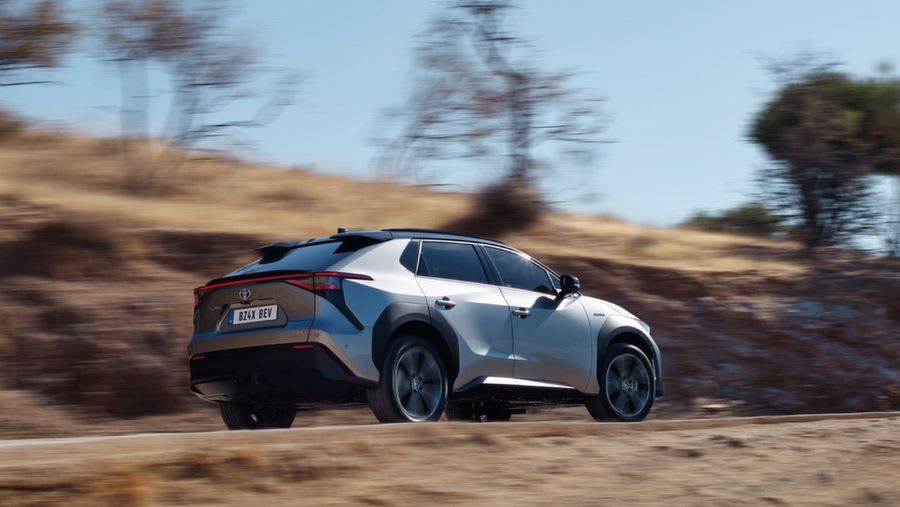
Toyota claims that this platform is designed to maximise interior space, making it practical.
It is certainly memorable to look at. There is a slight slope along the bonnet, but it drops off like a right-angled cliff face at the very front of the car. That means there's a lot of space along its face, with a large panel behind the number plate. This has a thin pseudo-grille above it and a proper, round-edged lower grille beneath it.
The wheel arches (which are black regardless of the primary body colour) also continue around the front. They form aggressive air intakes at either side, as well as surrounding the lower portion of the headlights, which are thin and sporty looking.
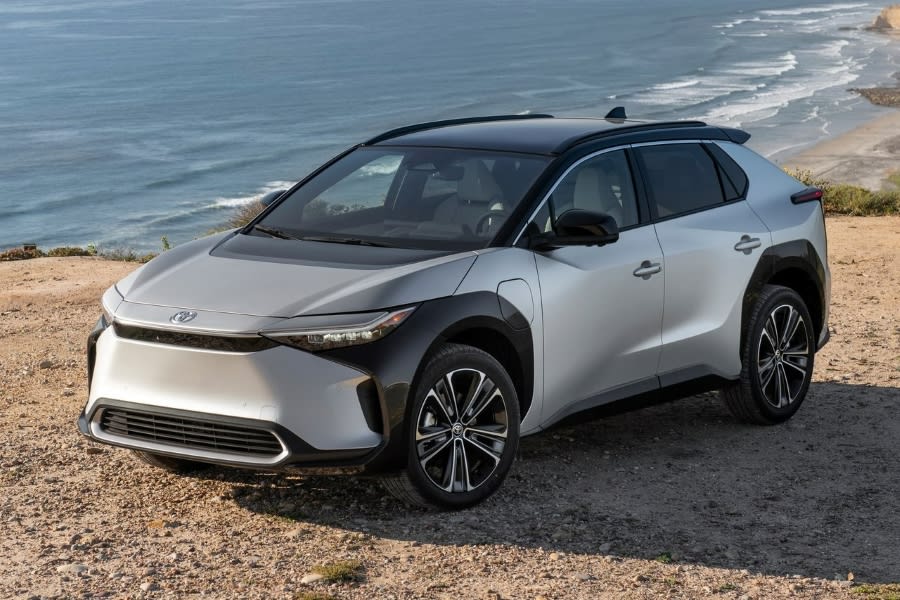
At the sides, the cliff-faced front end looks even more prominent. The sculpted doors create a widened ‘n’-shape above the side skirts and feature curved creases by the wing mirrors and the rear wheel arches.
There is a subtle yet modest sloping roofline, while the back features an angled rear window. It also has a slightly protruding lower bumper and taillights which reach around the sides, spanning the entire width of the top of the boot.
Key Features
There are four trims available.
Entry-level Pure features 18-inch alloys, cabin pre-heating, a reversing camera, and electric heated door mirrors. It also has keyless entry, dual-zone automatic air conditioning, an eight-inch infotainment screen, a DAB radio and Bluetooth, Apple CarPlay/Android Auto, a ‘Cloud’ Satnav, and voice assistant.
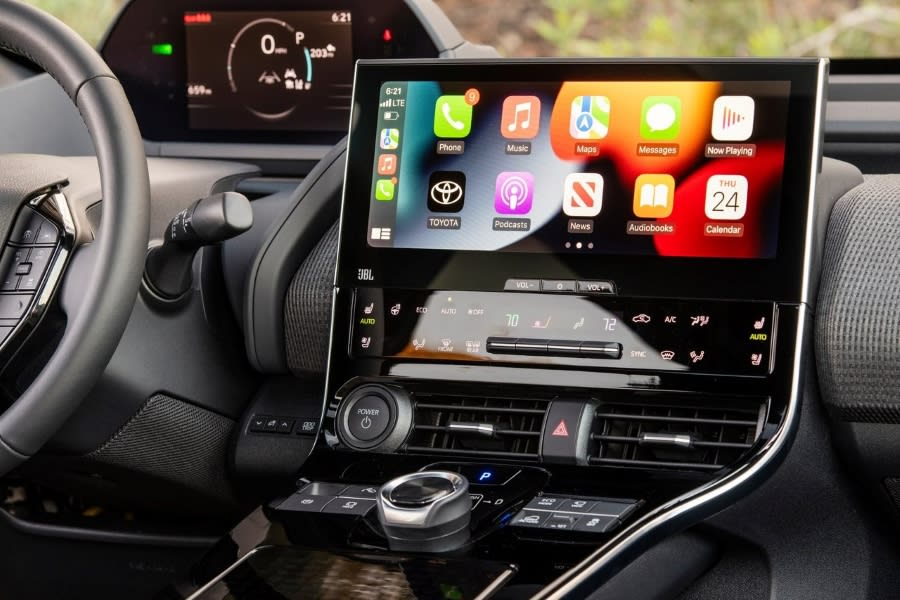
Motion trim gets you a powered tailgate with a modest roof spoiler, wireless phone charger, heated front seats, eight-way electric memory seat adjustment and lumbar support for the driver.
It also has footwell lights, front (as well as rear) parking sensors, synthetic half-leather seats, improved ambient lighting and an upgraded 12.3-inch screen with Toyota Touch 2 and Go Navigation.
Vision trim upgrades the alloys to 20-inches and adds a satin chrome-painted lower front grille. It also includes kick-activation on the tailgate, memory function on the door mirrors, a heated steering wheel and air-ventilated front seats.
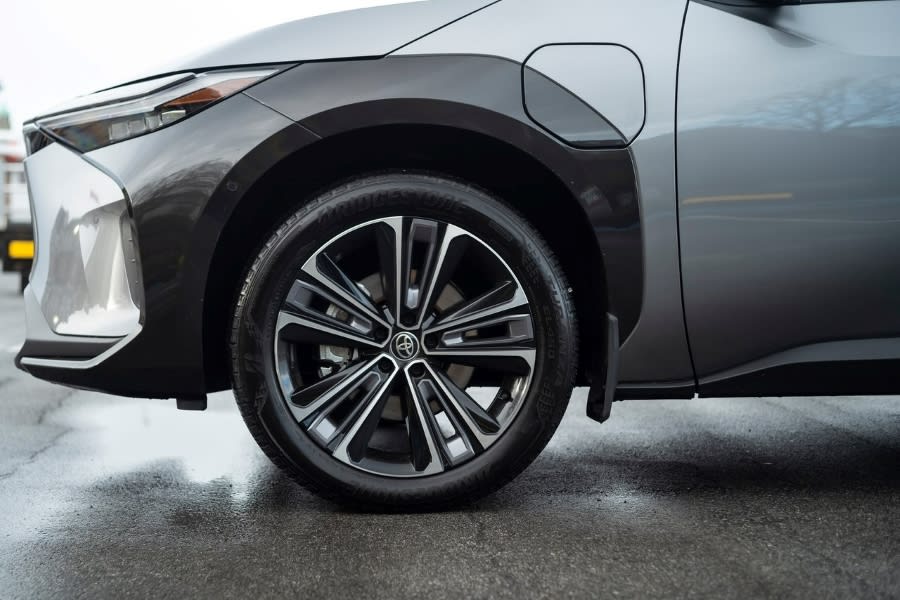
Top-of-the-range Premiere Edition adds a panoramic roof and a JBL premium sound system with three extra speakers (giving you nine instead of the standard six).
There are two powertrains available. First, there is a front-wheel drive version with a single motor, which produces 204PS. Then there’s the more powerful one which includes a second motor, resulting in four-wheel drive and 217PS.
Pure trim comes with front-wheel drive, while there’s a choice of two or four-wheel drive in Motion and Vision trims. Premiere Edition only has four-wheel drive available.
For those familiar with Tesla's new 'aircraft yoke' steering wheel, there will be a similar design available with the bZ4X. Mind you, you can opt for a regular steering wheel instead.
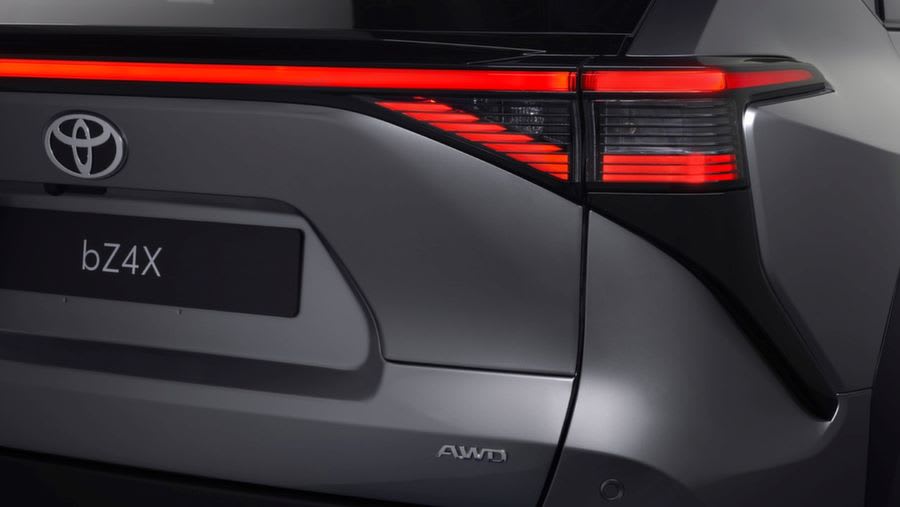
Range & Batteries
At the time of testing, the single-motor front-wheel drive variant had a range of around 280 miles, while the all-wheel drive version claimed it would do 255 miles.
Since we tested it, Toyota has confirmed it has increased the bZ4X’s range to 321 miles for the entry-level variant and 292 for the all-wheel drive version.
Both are still expected to have the same 71.4kWh battery as was initially planned, but it seems some extra juice has been extracted from it. To read more about exactly what kWh means, you can read our handy guide here.
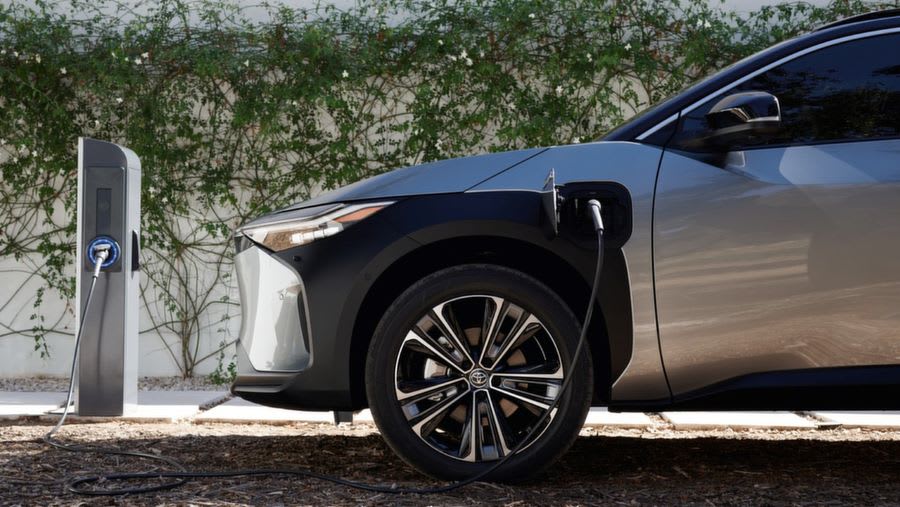
This is good news, as the original battery figures would have been more impressive a year or two ago. But now, some manufacturers are cracking the 300+ mile mark, even with more horsepower than the Toyota.
The Kia EV6 and the Tesla Model Y are among the other vehicles capable of over 300 miles.
Of course, the actual range depends on a bunch of factors, including ambient temperature, weather conditions and driving style. If range is a vital factor in your leasing decision, we've compiled a list of the top longest range EVs.
Performance & Drive
The front-wheel drive version has a 0-62mph time of 7.5-seconds, but it’s the higher-powered four-wheel drive dual motor that we’re driving.
As a result, we get to 62mph from a standing start in 6.9-seconds. Both versions have a top speed of 99mph (although we didn’t exceed 70mph in practice).
It feels impressively responsive, accelerating off the line with an instant burst of power. It doesn't feel lightning quick like some electric cars do, but it's sufficient to get you up to speed without feeling like you’re waiting around.
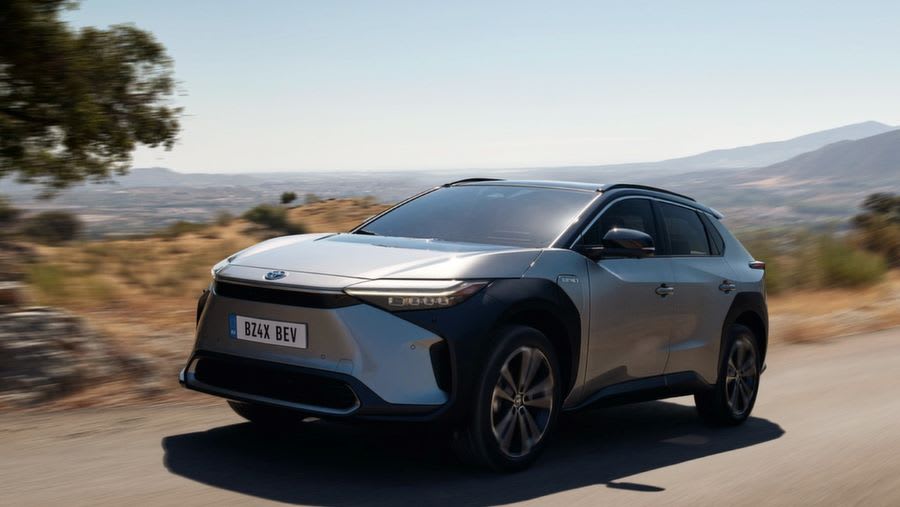
First impressions are that the car is more of a comfortable cruiser than a performance-focused mean machine. But it still has lots of personality and doesn’t feel lethargic.
Overtaking is straightforward, and it accelerates with consistency. Of course, some cars lose their pulling power at the top end, but getting from 50 to 70mph on a dual-carriageway to pass a slower car was simple enough.
Ride comfort-wise; the suspension is on the soft side, so it’s relaxing and easy to drive for long periods, feeling elegant on the move. In addition, the Toyota smooths out potholes reasonably well – and we were driving with the larger 20-inch wheels, so the standard 18-inch rims lower down the range will feel even comfier.
An absorbing suspension doesn't usually make for good handling, and, in truth, the bZ4X didn't like being thrown into corners much. We took it on a back route of twisty country lanes, and it felt out of its comfort zone at speed.
There is a bit of lean in bends, but it never feels out of control if you don’t go mad with it.
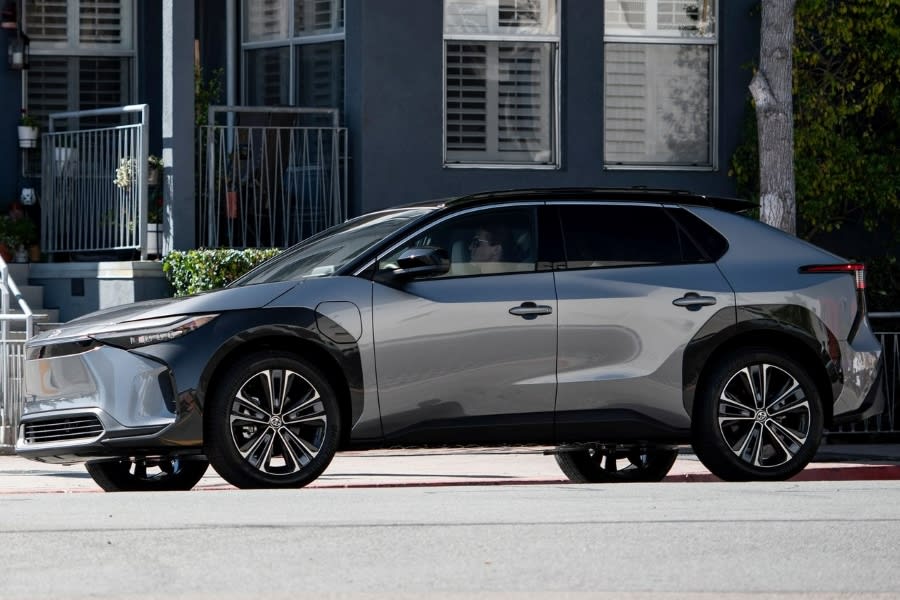
The steering isn’t fanciful, but it does the job nicely. There is a suitable level of heaviness without making your arms ache, and it provides good feedback.
The bZ4X’s party piece is that the four-wheel drive version we tested is also a competent off-roader. This is largely thanks to Toyota’s partnership with Subaru, which has given the former access to an adapted version of the latter’s X-Mode off-road system.
The result was it handled a nearby dirt track with as much ease as a freshly tarmacked motorway.
We couldn’t take it on a full off-road course. But Toyota obliged by showing us some extensive footage of it mastering a deep, mud-laden swamp, seemingly never struggling to find grip thanks to its onboard systems.
This tech ensures the wheel that needs the power most gets it. We were taken aback by the footage and now wonder if Toyota’s ‘beyond zero’ strategy includes amphibious cars that can drive through mud. Most impressive.
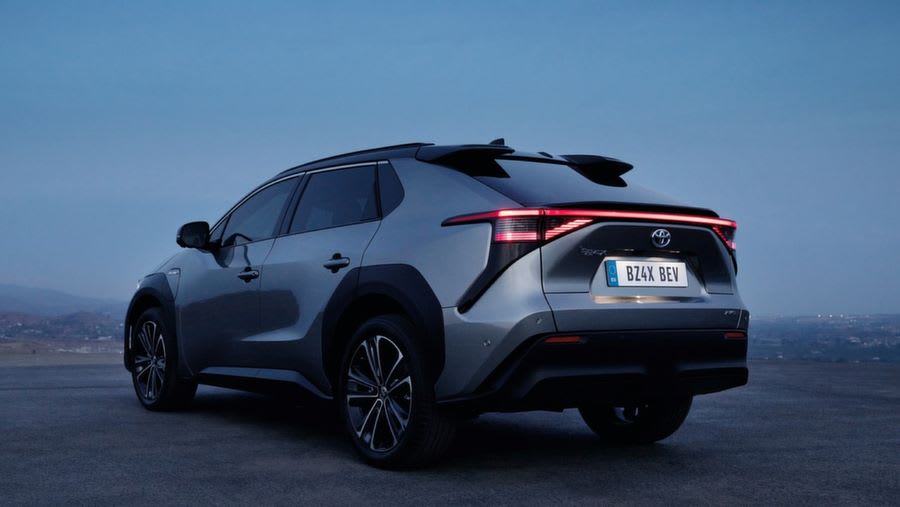
Charging
The Toyota bZ4X has a maximum charging speed of 160kW(150kW on front-wheel drive versions).
Like its range, it’s not bad and would’ve been impressive a year or two ago. But it’s not the quickest nowadays, with some manufacturers, including Kia, offering 200kW charging speeds.
Getting from a 10 to 80 per cent charge will take around 20 minutes, although a 7kW wall box will take 10 or 11 hours to get from empty to full.
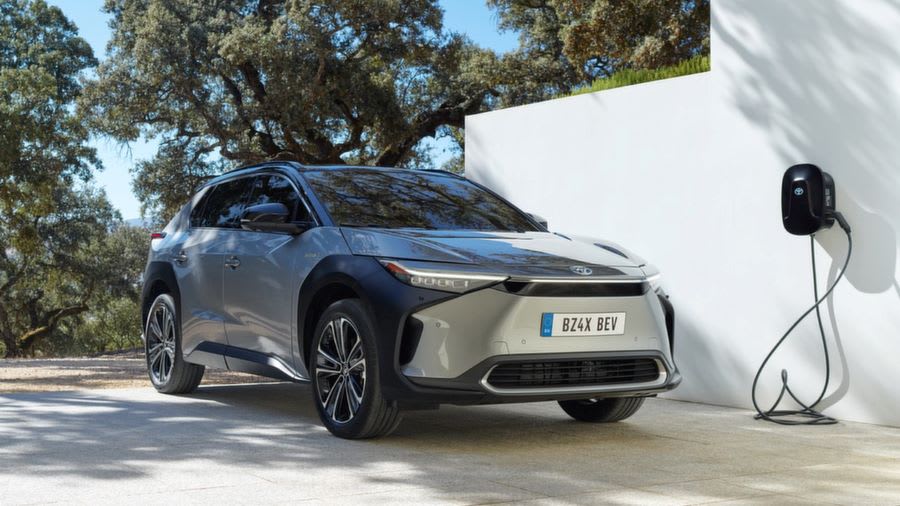
Running Costs & Emissions
Electric cars have fewer moving parts, so they don't need maintenance checks as often. Servicing details haven't been confirmed for the bZ4X, but more occasional check-ups mean money is saved.
Furthermore, zero-emissions mean low tax (for the moment, anyway) and company car tax will be low. Plus, even with energy price hikes, this Toyota will still prove far cheaper to run than a petrol or diesel.
The bZ4X is too new to know how reliable it will be, but Toyota has a solid reputation for build quality and dependability.
Interior & Technology
The bZ4X’s interior looks impressive, futuristic, and even somewhat luxurious. Not on a Tesla level, perhaps, but it nevertheless represents a clean break from the interior design of Toyota’s fossil-fuelled models.
As with many electric cars, there’s plenty of white, including the seats, part of the soft trim on the doors and the top of the armrest on the centre console. That said, much of the rest of the interior is a traditional black colour, but the contrast makes it look attractive.
The rest of the centre console looks like it’s floating in mid-air. And although the infotainment screen looks like a tablet, it blends into the section beneath it seamlessly.
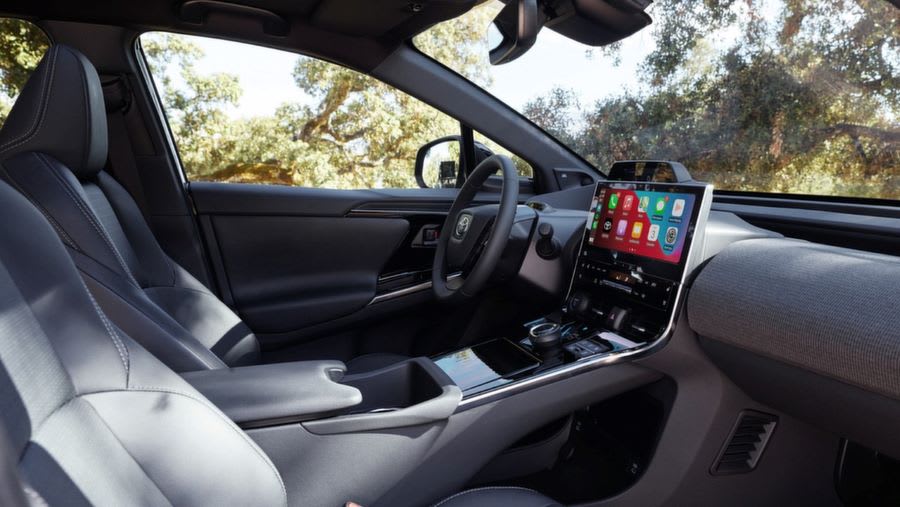
There are buttons for the gear selection and a handful of dials and switches, plus many buttons on the steering wheel. It is good to see that the Japanese automaker has resisted the temptation to digitise them all and secrete them within the infotainment system.
The system itself is lovely to use. It has a crisp and clear display, and it's responsive, although the system we tested wasn’t 100 per cent complete. Nevertheless, expect it to play a key role in terms of music selection, Satnav and viewing car and battery settings.
Apple CarPlay/Android Auto tech is included on all trims, but it’s not wireless on the entry-level version.
The bZ4X certainly feels relaxing and spacious inside, even though it isn’t a large SUV. And that makes it super easy to find a comfortable driving position.
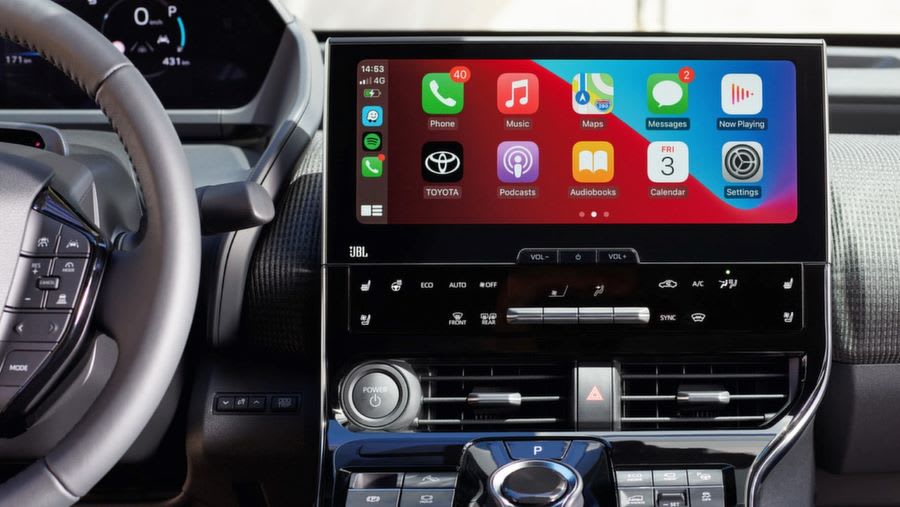
Practicality & Boot Space
Although the driving position is comfortable thanks to the cabin’s spaciousness and the seats, visibility isn’t the best.
The digital instrument display can be easily obscured by the top of the steering wheel (admittedly, this isn't a problem if you opt for the slightly fiddly 'aircraft yoke'). Additionally, the rear pillars are pretty thick, restricting your view out of the back, although the reversing camera helps mitigate this somewhat.
In the rear, there’s plenty of space. Although we didn’t have a tape measure to hand, we were surprised how well three adults fitted into the back of what is, after all, a reasonably small car.
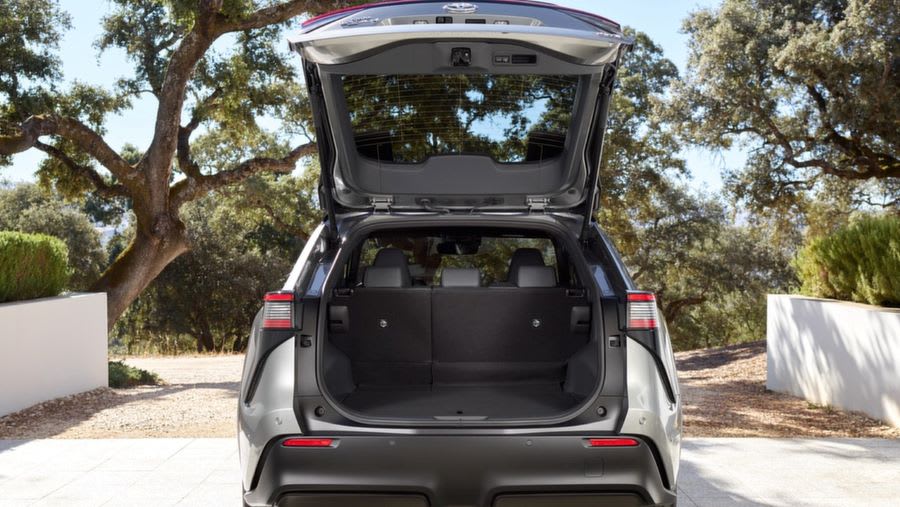
There is a lot of storage space inside the cabin, including a cubby in the centre console. There is also an enclosed space for your phone, and the door bins are a generous size. There is, however, no glove compartment, which is a little odd.
There are two USB-C sockets in the front, too.
Boot space is a tad lacking, with only 452-litres, well behind rivals like the Skoda Enyaq, which has just under 600-litres.
Toyota hasn’t yet measured the space with the rear seats down. But they fold away in a 60/40 split, although there are no easy-to-reach handles, which is frustrating.
There is limited storage underneath the boot floor. And, unlike some rivals, there’s no storage space under the bonnet.
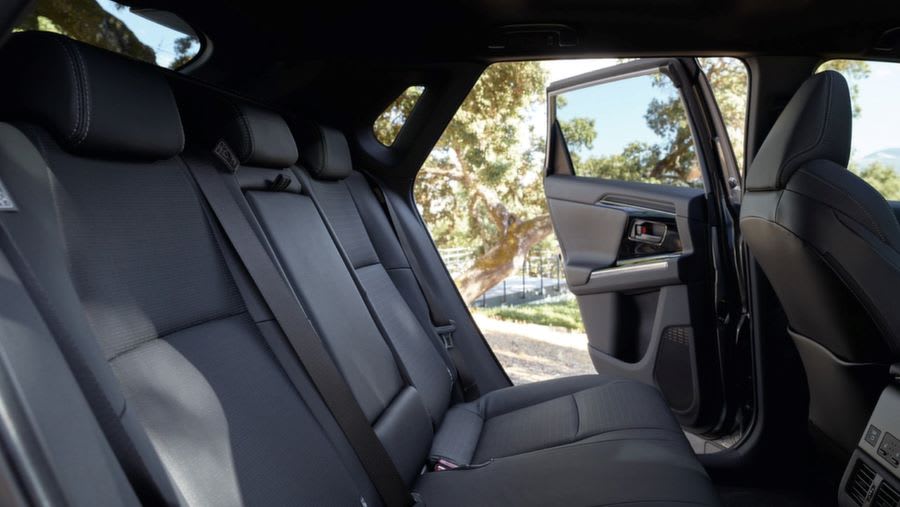
Safety
Euro NCAP is yet to crash-test a bZ4X, so we can’t say how safe it is. However, the last few Toyotas tested since 2018 all earned five-star ratings. They also scored impressively well with adult occupants, children, and safety assists, typically in the mid-80s or low-70s for their percentage scores.
This is a brand-new platform and Toyota’s first all-electric car, so there's some uncertainty here, but, if anything, we would hope it’ll be even safer. In particular, the safety assist score should get a boost from all the technology.
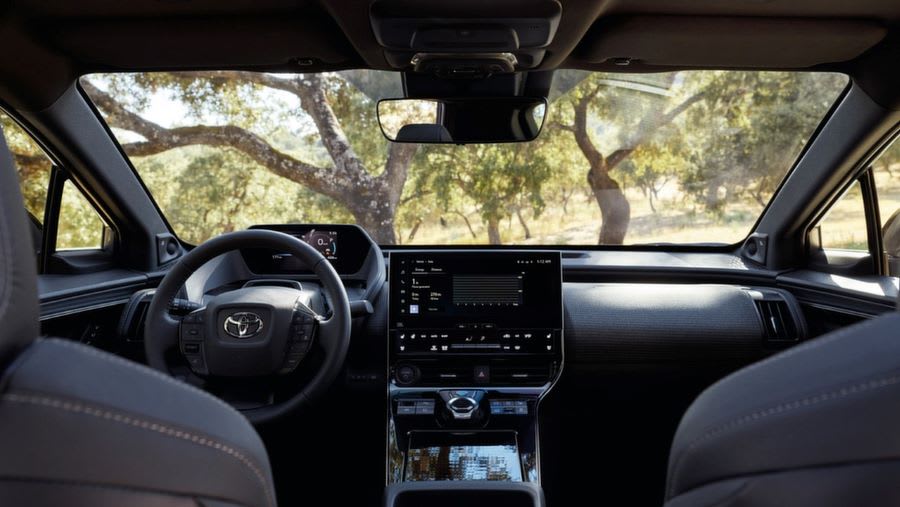
All models come with lane departure and steering control, lane trace assist, emergency driving stop system, oncoming car and motorbike detection, emergency steering assist, intersection turn assist, road sign assist and advanced parking assist.
Motion trim and above get a blind spot monitor, a 360-degree camera and a driver monitoring camera. Meanwhile, Vision and above get remote-controlled advanced parking assist. All of that is offered as standard.
Options
The Motion trim will offer an upgrade to 20-inch wheels (from the standard 18-inches). Unfortunately, this won't be available for the entry-level Pure trim, while 20-inches are standard on the Vision and Premiere Edition variants.
A 7kW onboard charger is standard, but it will be upgradeable on all trims to 11kW, while the panoramic roof (standard on the top-of-the-range trim) will also be available on the Motion and Vision mid-range trims as an optional extra.
Full synthetic leather seats in black or light grey are available for the top two trims, too.
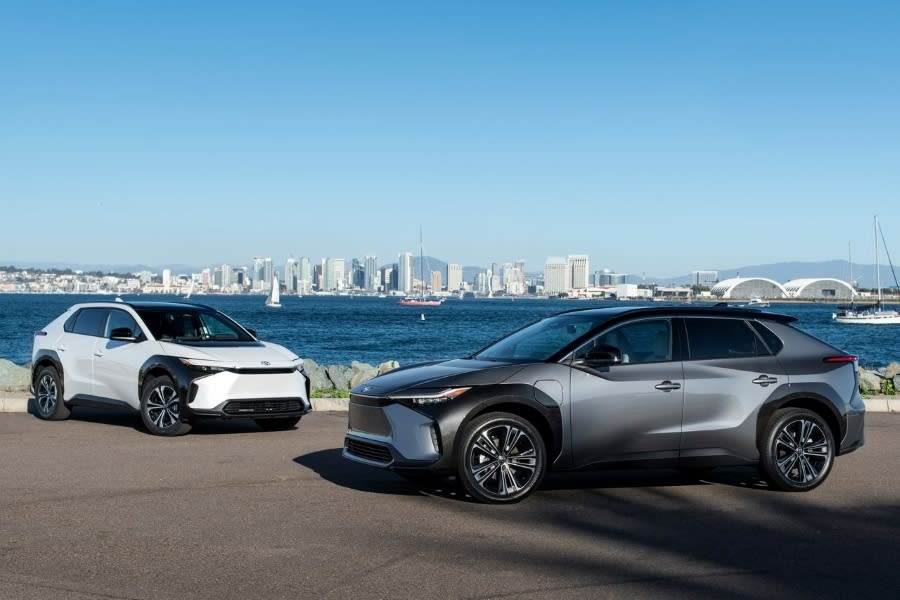
In terms of body colour, black is included on all trims, but if you want dark blue, it’s extra, while white, silver, red and dark grey are all more money, too.
Beyond that, expect the usual accessories such as floor mats, minor styling tweaks and tow bars.
Rival Cars
Other cars you’ll want to consider include the excellent Hyundai Ioniq 5 and the Skoda Enyaq iV. Unfortunately, both are cheaper than the bZ4X, which could present a problem for Toyota.
A Kia EV6, which also has many plus points, is cheaper, too.
If you don't mind forking out more, then the Volkswagen ID.4 is well worth considering, while if money isn’t an issue at all, then the Audi Q4 e-tron and Tesla Model Y are also vehicles worth looking at.
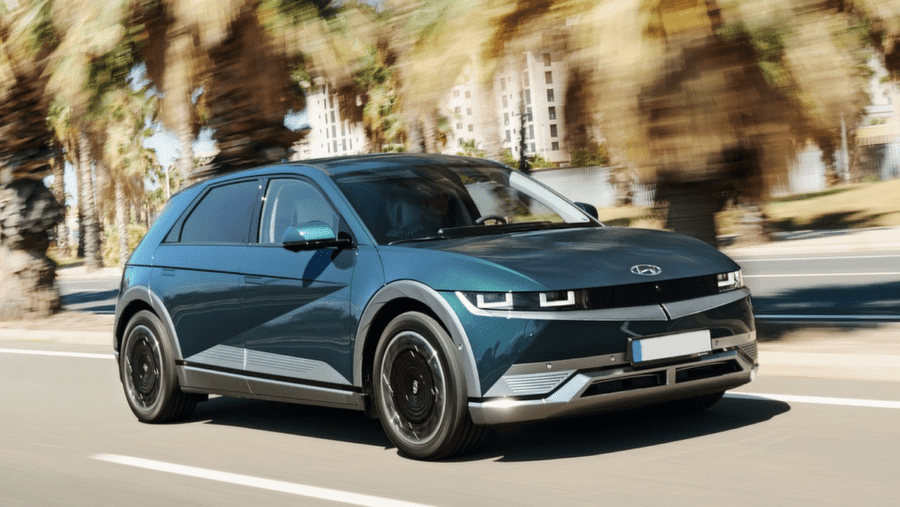
Verdict & Next Steps
The bZ4X is a solid performer and will have nearby rivals in its market segment rightly worried.
It feels well built, pulls away well with reasonable handling, and has a generously equipped interior with lots of gadgets and safety kit included as standard, too.
The second trim – Motion – is likely the one to go for, as you'll get the larger infotainment screen and some excellent extra features such as electric seats (plus those who want it can opt for the more powerful dual motor with four-wheel drive).
That said, the entry-level (which mandates two-wheel drive) will likely meet most needs, especially if there aren’t any swamps near where you live.
Other rivals might be able to compete or beat it for range, and the charging speed isn’t the fastest on the market.
But it’s practical, spacious and funky-looking – and Toyota has a great reputation for reliability.
Its name might be awkward to type out, but we suspect the bZ4X will be a favourite of many a household.
Where to next?
View our latest Toyota bZ4X Leasing Deal - from just £491.71 per month inc VAT**
Looking for a great leasing deal? Check out our incredible range of Special Offers
New hatchback? Read our latest Car Reviews and find the right model for you
Want to know more about leasing? Take a look at our comprehensive Leasing Guides
Interested in everything motoring? Why not catch up on all the latest Car Leasing News.
*Score based on Select’s unique meta score analysis, taking into account the UK’s top five leading independent car website reviews of the Toyota bZ4X
**Correct as of 13/04/2022. Based on 9 months initial payment, 5,000 miles over a 48 month lease. Initial payment equivalent to 9 monthly payments or £4,425.39 Ts and Cs apply. Credit is subject to status.






















